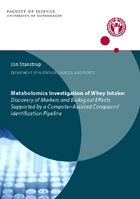PhD defence: Metabolomics investigation of whey intake
Discovery of markers and biological effects supported by a computer-assisted compound identification pipeline
Jan Stanstrup
PhD thesis
In the Western World dramatic changes in terms of wealth, health and lifestyle has created societies of affluence. However, the availability of an unrestricted amount of food and a more sedentary lifestyle has led to an increased prevalence of obesity and metabolic syndrome. Obesity and metabolic syndrome are complex disorders and are not caused by a high-calorie diet and low exercise level alone. The specific nature of the nutrients, independent of their caloric value, also play a role. The question is which.
In the quest to answer this question the qualitative intake of protein is of special interest since it has been shown that it is possible to achieve greater weight loss on a high protein diet as oppose to a high carbohydrate diet. Furthermore, it has been demonstrated that specifically milk-derived whey proteins have certain biological properties that might be beneficial in the treatment and prevention of the metabolic syndrome related to obesity and diabetes.
In this thesis the effects of whey intake on the human metabolome was investigated using a metabolomics approach. We demonstrated that intake of whey causes a decreased rate of gastric emptying compared to other protein sources. This is in contrast to previous findings suggesting that whey is cleared faster than other proteins. Paradoxically, we also find disproportionately elevated levels of some amino acids (AAs) following the whey meal. This suggests that whey affects absorption of AAs in a way independent from, or at least not wholly controlled by, gastric emptying. In addition, we find that whey caused decreased levels of a number of fatty acids due to increased insulin levels, which in turn is likely induced by the exaggerated AAs levels.
At present, the major bottleneck in metabolomics studies of this kind is compound identification. Therefore this thesis will also present and discuss state-of-the-art tools for computer-assisted compound identification, including: annotation of adducts and fragments, determination of the molecular ion, in silico fragmentation, retention time mapping between analytical systems and de novo retention time prediction. A pipeline combining these tools in a single workflow is described, and the potential impact in the field of metabolomics highlighted.
2014, 196 pages,
ISBN 978 87 7611 704 7
Time
21 February 2014 at 13:00
Venue
A2-70.04 - Marble Hall, Thorvaldsensvej 40, 1871 Frederiksberg C
Opponents
Professor Søren Balling Engelsen (Chair), Department of Food Science University of Copenhagen, Denmark.
Dr. Lorraine Brennan, School of agriculture and Food Science, Science Centre South, Ireland.
Professor Mogens Johannsen, Department of Forensic Medicine, Aarhus University, Denmark.
Supervisors
Professor Lars Ove Dragsted, Department of Nutrition, Exercise and Sports, Faculty of Science, University of Copenhagen, Denmark.
Assistant Professor Thaer Barri Mass Spectrometry, Chemometrics and Metabolomics Group, Department of Chemistry, Lund University Lund, Sweden.

